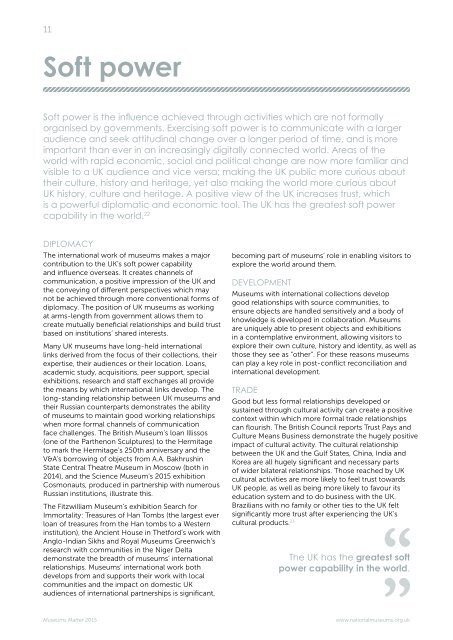Museums Matter
museums_matter_web
museums_matter_web
You also want an ePaper? Increase the reach of your titles
YUMPU automatically turns print PDFs into web optimized ePapers that Google loves.
11<br />
Soft power<br />
Soft power is the influence achieved through activities which are not formally<br />
organised by governments. Exercising soft power is to communicate with a larger<br />
audience and seek attitudinal change over a longer period of time, and is more<br />
important than ever in an increasingly digitally connected world. Areas of the<br />
world with rapid economic, social and political change are now more familiar and<br />
visible to a UK audience and vice versa; making the UK public more curious about<br />
their culture, history and heritage, yet also making the world more curious about<br />
UK history, culture and heritage. A positive view of the UK increases trust, which<br />
is a powerful diplomatic and economic tool. The UK has the greatest soft power<br />
capability in the world. 22<br />
DIPLOMACY<br />
The international work of museums makes a major<br />
contribution to the UK’s soft power capability<br />
and influence overseas. It creates channels of<br />
communication, a positive impression of the UK and<br />
the conveying of different perspectives which may<br />
not be achieved through more conventional forms of<br />
diplomacy. The position of UK museums as working<br />
at arms-length from government allows them to<br />
create mutually beneficial relationships and build trust<br />
based on institutions’ shared interests.<br />
Many UK museums have long-held international<br />
links derived from the focus of their collections, their<br />
expertise, their audiences or their location. Loans,<br />
academic study, acquisitions, peer support, special<br />
exhibitions, research and staff exchanges all provide<br />
the means by which international links develop. The<br />
long-standing relationship between UK museums and<br />
their Russian counterparts demonstrates the ability<br />
of museums to maintain good working relationships<br />
when more formal channels of communication<br />
face challenges. The British Museum’s loan Illissos<br />
(one of the Parthenon Sculptures) to the Hermitage<br />
to mark the Hermitage’s 250th anniversary and the<br />
V&A’s borrowing of objects from A.A. Bakhrushin<br />
State Central Theatre Museum in Moscow (both in<br />
2014), and the Science Museum’s 2015 exhibition<br />
Cosmonauts, produced in partnership with numerous<br />
Russian institutions, illustrate this.<br />
The Fitzwilliam Museum’s exhibition Search for<br />
Immortality: Treasures of Han Tombs (the largest ever<br />
loan of treasures from the Han tombs to a Western<br />
institution), the Ancient House in Thetford’s work with<br />
Anglo-Indian Sikhs and Royal <strong>Museums</strong> Greenwich’s<br />
research with communities in the Niger Delta<br />
demonstrate the breadth of museums’ international<br />
relationships. <strong>Museums</strong>’ international work both<br />
develops from and supports their work with local<br />
communities and the impact on domestic UK<br />
audiences of international partnerships is significant,<br />
becoming part of museums’ role in enabling visitors to<br />
explore the world around them.<br />
DEVELOPMENT<br />
<strong>Museums</strong> with international collections develop<br />
good relationships with source communities, to<br />
ensure objects are handled sensitively and a body of<br />
knowledge is developed in collaboration. <strong>Museums</strong><br />
are uniquely able to present objects and exhibitions<br />
in a contemplative environment, allowing visitors to<br />
explore their own culture, history and identity, as well as<br />
those they see as “other”. For these reasons museums<br />
can play a key role in post-conflict reconciliation and<br />
international development.<br />
TRADE<br />
Good but less formal relationships developed or<br />
sustained through cultural activity can create a positive<br />
context within which more formal trade relationships<br />
can flourish. The British Council reports Trust Pays and<br />
Culture Means Business demonstrate the hugely positive<br />
impact of cultural activity. The cultural relationship<br />
between the UK and the Gulf States, China, India and<br />
Korea are all hugely significant and necessary parts<br />
of wider bilateral relationships. Those reached by UK<br />
cultural activities are more likely to feel trust towards<br />
UK people, as well as being more likely to favour its<br />
education system and to do business with the UK.<br />
Brazilians with no family or other ties to the UK felt<br />
significantly more trust after experiencing the UK’s<br />
cultural products. 23<br />
The UK has the greatest soft<br />
power capability in the world.<br />
<strong>Museums</strong> <strong>Matter</strong> 2015<br />
www.nationalmuseums.org.uk


